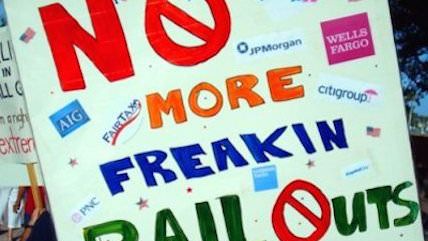Today's Bailout Anniversary Reminds Us That the Tea Party Is More Than Anti-Obama

Six years ago today, President George W. Bush signed into law the Emergency Economic Stabilization Act of 2008, which of course included the bailouts for large financial institutions, banks, and eventually Chrysler and GM automakers. While many think of the tea party as beginning with President Obama's stimulus plan, TARP under President Bush was the initial catalyst.
Remembering context is helpful here. The financial crisis had hit an apex that fall, as the Great Recession punished both hardworking and villain alike without regard to merit. Washington insiders felt they had to do something to contain the worst effects of the crisis. In the weeks preceding the bailout vote, the US government had already taken over Fannie Mae, Freddie Mac, and offered an $85 billion dollar bailout to American International Group (AIG).
President Bush admitted "I've abandoned free market principles" but reasoned he did so "to save the free market system."
Challenging political stereotypes—the Democrats, not the Republicans, ensured passage of bailouts to big banks and financial institutions. In the final house vote, 73 percent of House Democrats voted in favor of the bailouts, compared to 46 percent of Republicans. Despite prodding from Republican President Bush and republican Treasury Secretary Paulson, a majority—54 percent—of House Republicans still voted against the bailouts.
In the Senate, strong majorities of both Democrats (80 percent) and Republicans (69 percent) voted for bailout passage, but with significantly greater Democratic support.
So why were Republicans more opposed to the bailouts than Democrats?
Republican members of Congress faced vehement opposition from grassroots conservatives and libertarians opposed to providing taxpayer money to private businesses. And many of these angry grassroots grew into the eventual tea party movement.
Karl Rove explained that Republicans literally feared for their political futures over this one vote. Indeed, a simple statistical analysis shows House Republicans who voted for TARP in 2008 were 2.5 times more likely than Republicans who voted nay to be out of the House by 2010.
Some of the grassroots fervor is evidenced in the 60,000+ signatures collected at NoWallStreetBailout.com in the fall of 2008. A sampling of the petition signers' comments sounds a lot like the eventual tea party movement: [emphasis added]
"We're MAD As Hell & We're NOT going to take it ANYMORE! … RESTORE the AMERICAN WAY of LIFE!"—
"No Wall Street or auto bailouts! Maybe Americans should boycott paying 2008 federal income tax - no income tax revenue, no bailout."
"This bailout could end up breaking the spirit that underlies the true American way. The key word is "RESPONSIBILITY!" WHERE IS IT?!
"This is outright stealing from the taxpayers! We're socializing (government ownership or funding) every major industry of the economy. It's immoral, bad economically and unconstitutional."
"This bailout will destroy what remnants we have left of the free market economics, which have allowed this nation to become the worlds greatest economic power. It was precisely this kind of government interference that created a culture of recklessness within the financial Investments Industry that has led us to this national economic crisis. You do not have my consent (nor my future vote) to turn this nation into an economic dictatorship!"
"Our country will now be called, 'THE UNITED SOCIALIST STATES OF AMERICA,' if the government bails out and owns most of these failed companies."
Many of these grassroots conservatives who ardently opposed bailouts likely later comprised the early tea party movement. For instance, surveys show that tea party supporters have been the most opposed to the bailouts. A CBS/New York Times survey found that 79 percent of tea partiers thought the bailouts were unnecessary compared to 56 percent of non-tea party Republicans, and 51 percent of independents and 34 percent of Democrats.
Some might say tea party supporters vehemently opposed the bailouts because they wrongfully assumed President Obama was behind them. But this is not so.
A 2010 PIPA/Knowledge Networks poll found that eventual tea partiers were significantly more likely (67 percent) than non-supporters (49 percent) to know that President Bush signed TARP rather than Obama.
As subsequent elections have shown, the tea party channeled much of its frustration over the bailouts at the Republicans responsible for helping its passage, take for instance, former Sen. Robert Bennett, Sen. Orrin Hatch, Rep. Mike Castle, Rep. Bob Inglis among others.
So putting this all together, tea party conservatives—who are mostly Republicans—were the most opposed to the bailouts even though they were the most likely to know Republican leadership pushed for the action.
Of course, most Americans were not pleased about taxpayer money going to banks and automakers, but why did the conservative grassroots respond so passionately? Because many see bailouts, handouts, special favors to anybody as a moral issue. Rep. Michele Bachmann, eventual founder of the House Tea Party Congressional Caucus explained her opposition in moral terms:
"I voted against the bailout both times…We have also compromised the market of tomorrow by reversing the incentives critical to long-term stability: bailing out the bad actors and as a result punishing the good." [emphasis added]
From the perspective of tea partiers, six years ago today, the joint forces of Republicans and Democrats in Washington sent a clear message to the large, rich, and politically connected: they really are too big and too favored to be allowed to fail and that poor decision-making and excessive risk-taking may be chided but will ultimately be rewarded.


Show Comments (8)